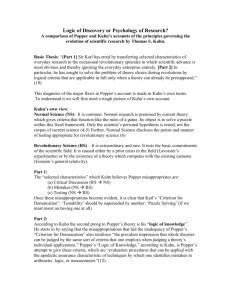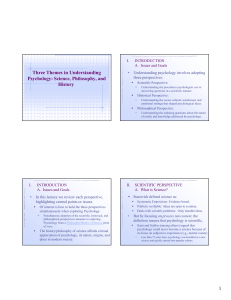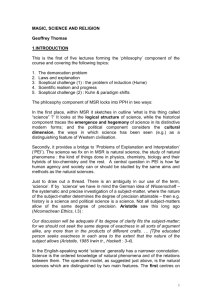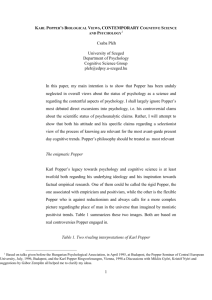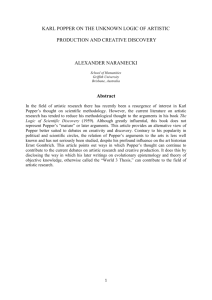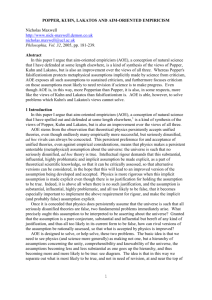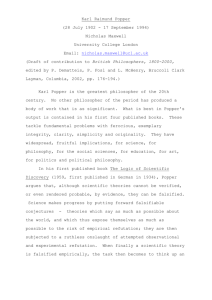Is psychology a science
advertisement
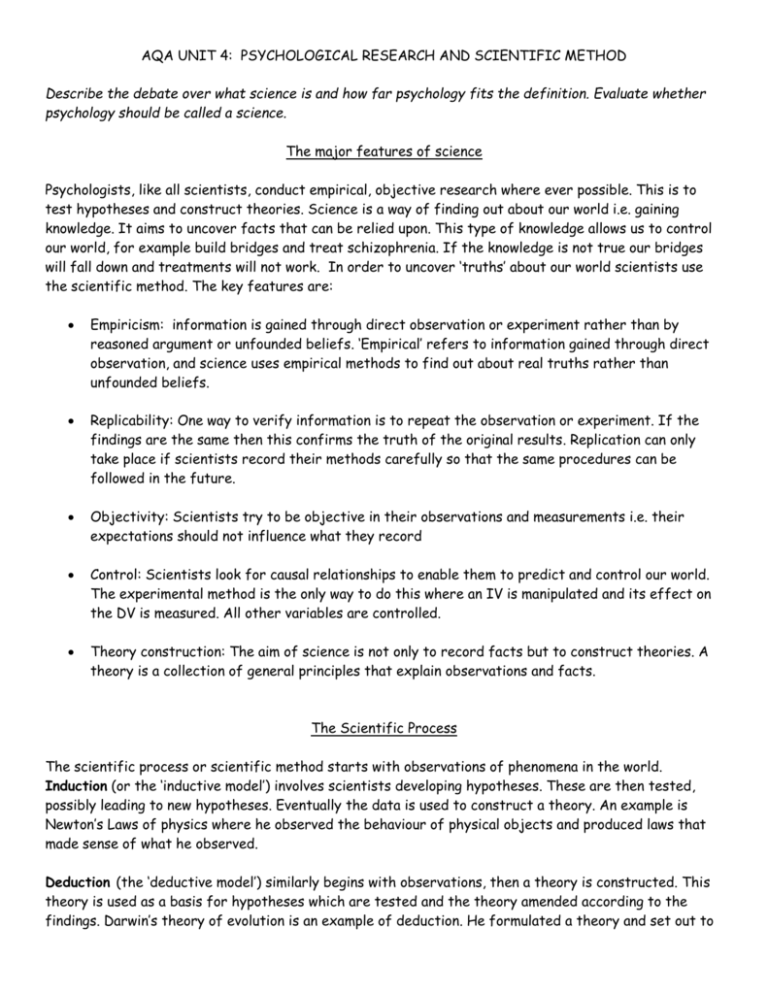
AQA UNIT 4: PSYCHOLOGICAL RESEARCH AND SCIENTIFIC METHOD Describe the debate over what science is and how far psychology fits the definition. Evaluate whether psychology should be called a science. The major features of science Psychologists, like all scientists, conduct empirical, objective research where ever possible. This is to test hypotheses and construct theories. Science is a way of finding out about our world i.e. gaining knowledge. It aims to uncover facts that can be relied upon. This type of knowledge allows us to control our world, for example build bridges and treat schizophrenia. If the knowledge is not true our bridges will fall down and treatments will not work. In order to uncover ‘truths’ about our world scientists use the scientific method. The key features are: Empiricism: information is gained through direct observation or experiment rather than by reasoned argument or unfounded beliefs. ‘Empirical’ refers to information gained through direct observation, and science uses empirical methods to find out about real truths rather than unfounded beliefs. Replicability: One way to verify information is to repeat the observation or experiment. If the findings are the same then this confirms the truth of the original results. Replication can only take place if scientists record their methods carefully so that the same procedures can be followed in the future. Objectivity: Scientists try to be objective in their observations and measurements i.e. their expectations should not influence what they record Control: Scientists look for causal relationships to enable them to predict and control our world. The experimental method is the only way to do this where an IV is manipulated and its effect on the DV is measured. All other variables are controlled. Theory construction: The aim of science is not only to record facts but to construct theories. A theory is a collection of general principles that explain observations and facts. The Scientific Process The scientific process or scientific method starts with observations of phenomena in the world. Induction (or the ‘inductive model’) involves scientists developing hypotheses. These are then tested, possibly leading to new hypotheses. Eventually the data is used to construct a theory. An example is Newton’s Laws of physics where he observed the behaviour of physical objects and produced laws that made sense of what he observed. Deduction (the ‘deductive model’) similarly begins with observations, then a theory is constructed. This theory is used as a basis for hypotheses which are tested and the theory amended according to the findings. Darwin’s theory of evolution is an example of deduction. He formulated a theory and set out to test it by observing animals in nature. He specifically sought to collect data to prove his theory. This is also known as the hypothetico-deductive model which was proposed by Popper (1935). He suggested that theories about the world should come first and be used to generate hypotheses which can be falsified. Falsification is, according to Popper, the only way to being certain. Popper said ‘no amount of observations of white swans can allow the inference that all swans are white, but the observation of a single black swan is sufficient to refute that conclusion’. Popper accused psychoanalysis and Freud of using unfalsifiable theories which were therefore not scientific. Is psychology a science? Psychology can be considered a science as it uses the scientific method and generates models which can be falsified. It also conducts well-controlled experiments to test these models/theories. However there is debate about whether just using the scientific method is sufficient to make psychology a science. Miller (1983) argues that psychologists who claim to be scientists are just ‘dressing up’ – they are using scientific tools but it is no more than a pseudoscience. Kuhn (1962) claimed that psychology could not be a science because there is no single paradigm (theory/shared assumptions). A science such as biology has a unified set of assumptions whilst psychology has many different paradigms (e.g. different approaches – cognitive, behavioural etc).Each paradigm has its own way of explaining behaviour, for example the learning approach claims that behaviours are acquired through different learning processes whilst the biological psychologist claims that behaviours are due to physical, biological processes. Therefore Kuhn suggested that psychology is a ‘pre-science’. Kuhn also believed that scientific knowledge about the world develops through revolutions rather than the theory falsification proposed by Popper. A theory or paradigm may remain dominant despite occasional challenges by disconfirming studies. Eventually the disconfirming evidence accumulates until the existing theory can no longer be maintained and it is then overthrown. Kuhn claims that scientific progress is more like a religious conversion and is related to social factors. This viewpoint differs greatly from Popper’s view that scientific changes are logical and systematic. Another issue regarding the scientific nature of psychology is that of objectivity and control. Psychologists try to measure human behaviour objectively yet some claim this is not possible as humans react to being tested (e.g. demand characteristics, experimenter bias). This reduces the validity of many psychological experiments. Heisenberg (1927) however, claimed that the same problem can occur in physics where just the presence of the experimenter can alter the behaviour of what is observed. There is debate about whether psychology should even attempt to be considered a science. Criticisms centre on the issue that the scientific method is reductionist and determinist. It is reductionist because it reduces complex phenomena to simple variables. This may have the advantage of telling us about cause and effect. However reductionism is a problem when complex behaviour is over-simplified and the studies end up having very low ecological validity. Determinism is necessary for the study of causes of behaviour. Without it we would not be motivated to find out whether A causes B and it provides valuable insight into the role of factors such as nature and nurture. However determinism can oversimplify the relationship between causes and effects.





